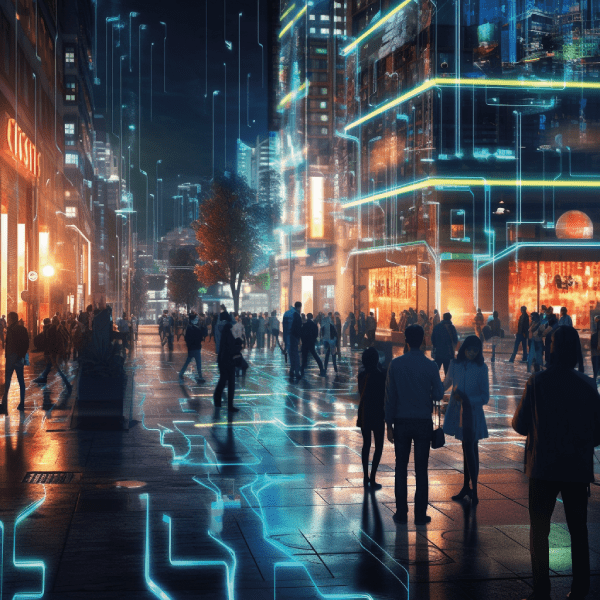Introduction
In today’s rapidly evolving world, the integration of artificial intelligence (AI) and the Internet of Things (IoT) has the potential to revolutionize the way we live, work, and interact with our environment. This blog post explores the possibilities and challenges associated with harnessing AI technologies to achieve our complete vision for sustainable smart cities.
Technology and accelerating the drive to sustainability
The marriage of AI and IoT offers promising opportunities to accelerate the drive toward sustainability in future smart cities. These technologies enable real-time data collection, analysis, and decision-making, allowing us to optimize resource consumption, reduce waste, and enhance the overall efficiency of urban systems. By harnessing the power of AI and IoT, we can develop innovative solutions that address pressing environmental and social challenges.
Urban planning and design
The integration of AI and IoT in urban planning and design is a crucial aspect of building sustainable smart cities. These technologies can optimize transportation networks, reduce traffic congestion, and promote the use of eco-friendly modes of transportation. AI algorithms can analyze data on population density, land use, and environmental factors to inform optimal placement of green spaces, infrastructure, and amenities.
Additionally, IoT sensors can monitor air and water quality, noise levels, and energy consumption to create healthier and more livable urban environments. By harnessing AI and IoT in urban planning, cities can maximize resource efficiency and create sustainable and resilient communities.
Circular economy and waste management
AI and IoT have the potential to transform waste management systems and foster the transition to a circular economy in smart cities. Intelligent waste management systems can optimize collection routes, reducing fuel consumption and greenhouse gas emissions. AI algorithms can analyze data on waste generation patterns to identify opportunities for recycling and waste reduction.
Furthermore, IoT sensors can monitor waste containers, enabling real-time alerts for efficient collection. By embracing the principles of a circular economy and leveraging AI and IoT, smart cities can minimize waste generation, promote recycling, and create a sustainable and resource-efficient waste management ecosystem.
Energy grid optimization and renewable integration
AI and IoT can play a crucial role in optimizing energy grids and integrating renewable energy sources in smart cities. AI algorithms can analyze energy consumption patterns, predict demand, and optimize energy distribution to minimize wastage. IoT sensors can monitor energy usage in buildings, enabling real-time adjustments and demand response mechanisms.
Moreover, AI can facilitate the integration of renewable energy sources such as solar and wind power, balancing supply and demand for a more sustainable energy mix. By leveraging AI and IoT in energy management, smart cities can reduce carbon emissions and move towards a cleaner and more sustainable energy future.
Smart homes will become more sophisticated
One area where AI and IoT will have a significant impact is in the development of smart homes. As AI technologies advance, homes will become more sophisticated, seamlessly integrating with IoT devices to enhance energy efficiency and convenience.
Smart homes can optimize energy consumption by adjusting lighting, heating, and cooling based on occupancy and weather conditions. AI-powered home assistants can provide personalized recommendations for energy-saving practices, reducing the overall ecological footprint of households.
Ethical considerations in AI and IoT
While AI and IoT technologies offer tremendous potential for sustainable smart cities, it is essential to address the ethical considerations associated with their implementation. Privacy and security concerns arise as vast amounts of data are collected and analyzed. It is crucial to establish robust data protection measures, ensure transparency in data usage, and obtain informed consent from individuals.
Additionally, algorithms must be developed with fairness and bias mitigation in mind to avoid perpetuating social inequities. By upholding ethical standards, smart cities can build trust among residents and stakeholders, fostering long-term sustainability.
Conclusion
The integration of AI and IoT in smart cities holds immense potential for sustainability. These technologies enable optimized resource consumption, efficient urban systems, and informed decision-making. AI assists in developing sustainability strategies, while IoT enhances urban planning and design.
Waste management and energy grids can be optimized, and smart homes can become more energy-efficient. However, ethical considerations like privacy and fairness must be addressed. By upholding ethical standards, smart cities can build trust and create a sustainable future for all.
Interesting facts
- Masdar City, located in Abu Dhabi, is a prime example of a sustainable smart city. It is designed to be zero-carbon and zero-waste, with renewable energy sources and efficient transportation systems.
- Songdo International Business District in South Korea is another sustainable smart city that utilizes advanced technologies for energy management, waste recycling, and smart transportation.
- By 2050, it is projected that around 68% of the world’s population will be living in urban areas, highlighting the importance of sustainable smart city development.
- Sustainable smart cities aim to reduce energy consumption. For instance, Barcelona implemented smart lighting systems that resulted in energy savings of up to 30%.
- Amsterdam’s smart city initiatives include a vast network of sensors to monitor air quality, noise levels, and waste management, enhancing the overall livability and sustainability of the city.
- The concept of circular economy, which emphasizes minimizing waste and promoting recycling, is a fundamental principle in sustainable smart cities. It aims to create a closed-loop system where resources are continuously reused.
- Sustainable smart cities promote sustainable transportation options, such as electric vehicles and efficient public transportation systems, to reduce carbon emissions and improve air quality.
- Singapore’s smart city initiatives include an extensive sensor network, real-time data analytics, and smart urban planning to optimize resource allocation and enhance sustainability.
- The United Nations Sustainable Development Goals (SDGs) emphasize the importance of sustainable cities and communities, encouraging the adoption of smart technologies and practices for long-term environmental and social well-being.



